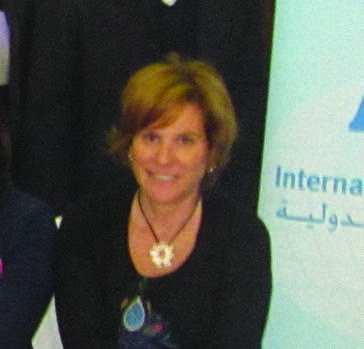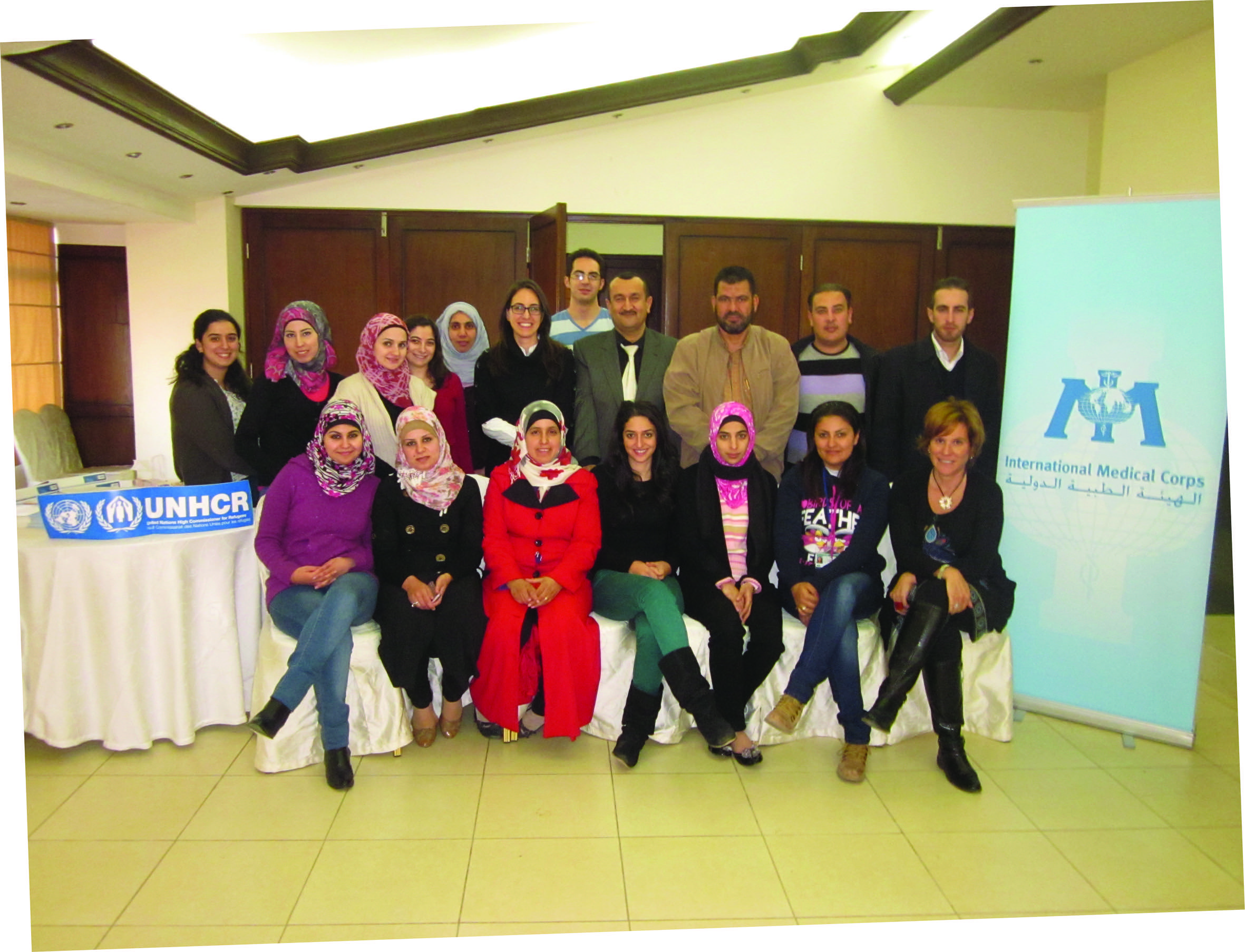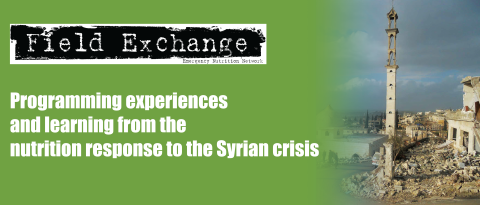Experiences on Nutrition in Emergencies Training for Syrian refugees response in Jordan
 By Caroline Abla
By Caroline Abla
Caroline Abla is the Director of the Nutrition and Food Security Department at International Medical Corps. Caroline has over 22 years of international experience in managing nutrition and public health programmes both in the field and at headquarters. She has implemented programmes in Somalia, Rwanda, Burundi, and Kenya and has responded to humanitarian emergencies including nutrition crises in Ethiopia, Niger, Kenya, Darfur, and Haiti.
International Medical Corps would like to acknowledge UNHCR for funding this NiE training.
With funding from UNHCR, International Medical Corps (IMC) developed and conducted a five days Nutrition in Emergencies (NiE) training course in Arabic, adapted to the Syrian refugee context in Jordan, for 23 health providers from national and international non-governmental organisations (NGOs) and United Nations (UN) agencies assisting Syrian refugees living in Za’atari camp and in host communities. The five days NiE training was conducted from December 16-20, 2012 in Irbid, Jordan. The course focused on infant and young child feeding in emergencies (IYCF-E); maternal nutrition and anaemia; chronic diseases and nutrition in emergency contexts; as well as coordination and nutrition assessments.
 Lessons learnt from previous NiE trainings conducted in Lebanon by the American University in Beirut1 (AUB) and the International Orthodox Christian Charities (IOCC)2, discussions with UNHCR at field and Geneva level, and information gathered from health providers providing services to Syrian refuges in Lebanon, Jordan, and Turkey and to Syrians in Syria, were used to develop the Jordan NiE training. All of the above showed that IYCF; micronutrient deficiencies especially anaemia in women and children; maternal nutrition and chronic disease were critical contextual issues to address in the training. Health care providers and social workers needed the tools and knowledge to counsel Syrians on exclusive breastfeeding and appropriate complementary feeding; nutrition intervention for chronic diseases such as diabetes, heart disease, hypertension, and obesity; prevention and treatment of anaemia and adequate maternal nutrition; and assessment of nutritional status.
Lessons learnt from previous NiE trainings conducted in Lebanon by the American University in Beirut1 (AUB) and the International Orthodox Christian Charities (IOCC)2, discussions with UNHCR at field and Geneva level, and information gathered from health providers providing services to Syrian refuges in Lebanon, Jordan, and Turkey and to Syrians in Syria, were used to develop the Jordan NiE training. All of the above showed that IYCF; micronutrient deficiencies especially anaemia in women and children; maternal nutrition and chronic disease were critical contextual issues to address in the training. Health care providers and social workers needed the tools and knowledge to counsel Syrians on exclusive breastfeeding and appropriate complementary feeding; nutrition intervention for chronic diseases such as diabetes, heart disease, hypertension, and obesity; prevention and treatment of anaemia and adequate maternal nutrition; and assessment of nutritional status.
The curriculum for the Jordan NiE was based on the IASC Harmonised Training Package (HTP)3 developed under the umbrella of the Global Nutrition Cluster, which was used to develop the two previous NiE Arabic trainings in Lebanon. However, the HTP and the NiE Arabic curriculum that already existed did not include a module on chronic diseases and their nutrition intervention in emergencies. Additionally, the HTP did not include a specific module on maternal nutrition, but rather had some relevant information scattered in the different modules that needed to be collated. Moreover, the team developed case studies relevant to the Syrian refugee situation in Jordan (camp and non-camp refugees) which differs from the situation in Lebanon (non-camp refugee setting).
For the chronic diseases presentation, education materials that had been developed by IMC and AUB for the Iraqi refugees in Lebanon were used and provided to the Jordan trainees. On one side of the materials there are pictures of what is acceptable and not acceptable to eat according to the chronic disease diet. On the other side, there is written guidance that the health or social worker can provide to the patient. These materials were felt to be adequate to use for the Syrian refugees since the pictures were region appropriate and the Arabic was the official Arabic that is read in all the Middle East.
On day one of the training, the focus was on the causes and types of malnutrition in emergencies and appropriate nutrition interventions in emergencies. On day two, the focus was on assessment in emergencies, assessing nutrition status and needs of at-risk populations, monitoring of nutrition interventions, and micronutrient deficiencies and interventions in emergencies. On day three, the focus was on addressing the needs of pregnant and lactating women in emergencies; common chronic nutrition diseases and their nutritional management, and considerations for chronic disease management in an emergency.
Days four and five, focused on IYCF including an introduction on IYCF-E, guidance on IYCF - getting to know the Code, and optimal IYCF: recommendations for breastfeeding and complementary feeding guidance and support, breastfeeding mother support counselling and education, and operational guidance on IYCF for community health workers assessment and case management.
Coordination between the sectors, as well as between different players providing assistance, was woven into all the presentations. The trainers drove home the concept that the prevention and treatment of malnutrition requires a multi-sectoral approach and close coordination between NGOs, UN agencies, Ministry of Health (MoH), and affected populations. The cluster approach was mentioned but not detailed since this is a refugee crisis and so coordination is within UNHCR’s mandate for response.
Daily feedback was solicited from the participants and an end of training evaluation was also conducted. The participants felt that the training was of great value to them. They learnt new skills that will help them improve the quality of their work. They also appreciated the interactive format of the training, that the examples and case studies were reality based from the Syrian context and that they were provided with tools to solve current issues that they face in their day to day work.
The main conclusions from this training was that there is need to develop an HTP module on maternal nutrition and one on chronic diseases in emergencies as these two are currently not fully covered in the HTP modules. In addition, there is need for a critical mass of trained responders to the Syrian crisis on NiE.
For more information, contact: Caroline Abla, email: cabla@internationalmedicalcorps.org
1 Source: Dr. Hala Ghattas, American University of Beirut
2 Source: Linda Shaker-Berbari, International Orthodox Christian Charities (IOCC)
3http://www.ennonline.net/htpversion2/modules Available at:


